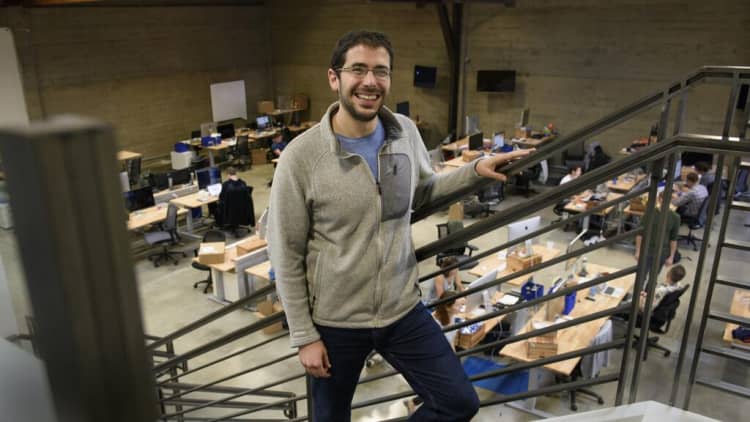
It's been a gold rush for education start-ups, with venture investors betting that schooling is poised for a technology face-lift.
But making money in the space hasn't been so easy. School budgets remain tight, educators are typically underpaid and students have grown up in a world dominated by free Facebook and Snapchat apps.
Heading into the 2016-2017 school year, Remind — a start-up that already has some 35 million users — is ready to test its first cash-generating model.
The San Francisco-based company led by two brothers has spent the past five years developing a mobile communication service for teachers, students and parents that is now used in some capacity by over half of U.S. public schools and three-quarters of districts.
John Doerr, the venture capitalist who made a fortune on Amazon.com and Google, is a major backer. His firm Kleiner Perkins Caufield & Byers along with Social Capital and other investors have poured $60 million into the company. Funding of ed-tech companies peaked last year at $3.3 billion, covering 511 deals, according to CB Insights.
The purpose of Remind is to eliminate all of the back-and-forth paperwork that takes place when classes go on field trips, hold fundraisers and schedule school plays. Through a secure messaging system, it also lets teachers communicate with parents about homework assignments.
Now teachers can use Remind's new feature called Activities to collect payments for events. Remind charges 5 percent to the participant. For example, if a third-grade class is visiting an art museum and the charge is $10 per student, parents can submit the payment on Remind the same way they'd buy from Amazon or order an Uber. The total cost would be $10.50, with Remind generating 50 cents in revenue.
"We talk to all our users and they tell us how much of a pain point it is to collect money," said Brett Kopf, Remind's co-founder and CEO. "This is the biggest expansion of our messaging product and our first revenue stream."
The 5 percent charge includes the cost of the credit or debit card transaction. Remind is using software from Stripe to manage those payments.
While 2015 was a banner year for ed-tech deals, Remind last raised cash the prior year. Plenty of companies broadly in the space have pulled in much bigger sums. TutorGroup, an online learning platform, has raised $315 million from backers including Alibaba Group. HotChalk, which helps colleges and universities bring their programs to the web, has raised $249 million, and Pluralsight, a provider of video-based courses, has raised $208 million, according to CB Insights.
Among start-ups focused on kindergarten through 12th grade, Remind is one of the better-funded companies, along with Edmodo, Schoology and ClassDojo.
Finding a working business model remains a challenge for all of them, but Remind has a massive user base to potentially fuel the revenue engine.
As of Monday, Remind ranked 16th among all iPhone apps in the U.S., just ahead of Uber and one spot behind "Pokemon Go," according to App Annie. It was 44th in Google Play and the most popular education app.
"The most incredible thing is that Remind has literally ripped through the education system," said Chamath Palihapitiya, a partner at Social Capital and Remind board member. Palihapitiya said the long-term potential is for the product to reach billions of users, "but how we get there will depend on how well we execute and manage the culture as we continue to grow."
In an early test of the new product, more than 10,000 activities have been created, with more than $1 million being requested, Kopf said. Money is going toward field trips, team uniforms, sporting events and fundraisers.
Kopf didn't say what will come next as far as generating revenue, but he said it will all be around products that users are requesting and that can simplify their lives.
As an investor, Palihapitiya sees plenty of opportunities to make money in education, when considering the inefficiencies in how governments, municipalities and districts spend. He expects Remind to get paid for adding real value.
"We have to think very closely about tying the business model to an outcome that is measurable and important," he said. "The problem now is that a lot of money is spent in a way that doesn't create any accountability."





